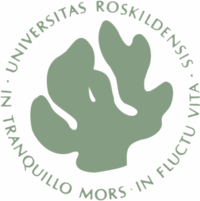Roskilde University
| Roskilde University | |
|---|---|
| Roskilde Universitet | |
 | |
| Motto | In tranquillo mors - in fluctu vita |
| Motto in English | In silence, death; in movement, life |
| Established | 1972 |
| Type | Public |
| Rector | Ib Poulsen |
| Admin. staff | 1200 |
| Students | 14,114 including part time students (2012) |
| Location |
Roskilde, Denmark |
| Campus | Roskilde |
| Affiliations | EUA, UArctic |
| Website | www.ruc.dk/en/ |
Roskilde University (Danish: Roskilde Universitet, RUC) is a Danish public university founded in 1972 and located in Trekroner in the Eastern part of Roskilde. The university awards bachelor, master's degrees and Ph.D. degrees in a wide variety of subjects.
History

The university was founded in 1972 and was initially intended as an alternative to the traditional Danish universities which had been the scene of several student uprisings in the late 1960s. The students considered the traditional universities undemocratic and controlled by the professors and wanted more influence as well as more flexible teaching methods.
In the 1970s the university was known for its very liberal education as opposed to the usual lectures provided by the more traditional universities of Copenhagen and Århus. The focus was shifted from traditional lectures to group orientated methods and projects rather than traditional exams.
Back in 1972, these educational ideas were both unorthodox and controversial, but the traditional universities in Denmark have now adopted much of the original RU concept themselves, not least the concept of group project work, which is today a recognised academic method. RU can also be said to have brought to Denmark the Anglo-Saxon concepts of interdisciplinarity and less well-defined boundaries between academic fields.[1]
Some notable alumni and professors from RUC include:
- Andreas Bang Hemmeth (DJ Encore)
- Johanne Schmidt-Nielsen
- Simon Emil Ammitzbøll
- Vincent F. Hendricks
Organization and Administration
The university is governed by a board consisting of 9 members: 5 members recruited outside the university form the majority of the board, 1 member is appointed by the scientific staff, 1 member is appointed by the administrative staff, and 2 members are appointed by the university students. The Rector is appointed by the university board. The rector in turn appoints deans and deans appoint heads of departments. There is no faculty senate and faculty is not involved in the appointment of rector, deans, or department heads. Hence the university has no faculty governance.[2]
Departments
Roskilde University has 6 departments (institutes) specializing in very different areas from Mathematics to International Development:
- Communication, Business and Information Technologies (CBIT)
- Culture and Identity (CUID)
- Environmental, Social and Spatial Change (ENSPAC)
- Psychology and Educational Studies (PAES)
- Science, Systems and Models (NSM)
- Society and Globalisation (ISG)
The university offers four basic studies programmes:
- Basic Studies in the Humanities
- Basic Studies in the Social Sciences
- Basic Studies in the Natural Sciences
- Basic Studies in Humanistically applied Natural Sciences
Working conditions at Roskilde University
In November 2009, the national Danish Working Environment Authority published a report about the working environments at the Institute for Communication stating that "the university's combination of large work responsibilities and time pressure risks influencing the physical and psychological health of the employees in the short and long term". The Working Environment Authority has ordered Roskilde University to develop a plan for solving these problems. [3]
References
- ↑ http://www.ruc.dk/en/about-the-university/rucs-profil/the-history-of-roskilde-university/
- ↑ "Roskilde Universitet - Bestyrelse". Retrieved 2009-11-20.
- ↑ "Arbejdtilsynet trykker på alarmknappen". Nov 2009. Retrieved 2009-11-20.
External links
Coordinates: 55°39′14″N 12°08′28″E / 55.65389°N 12.14111°E